#beth herbert
Text
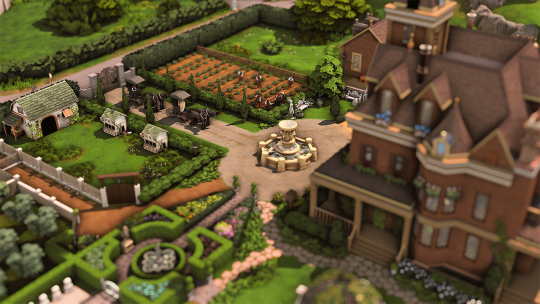
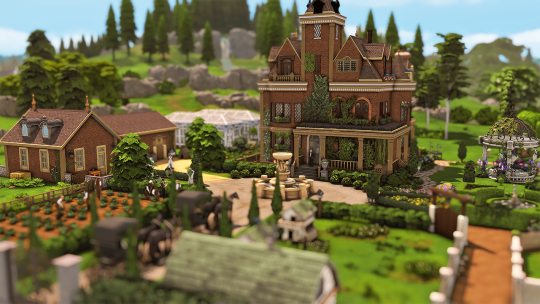
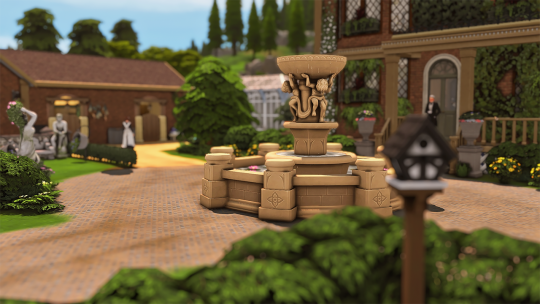

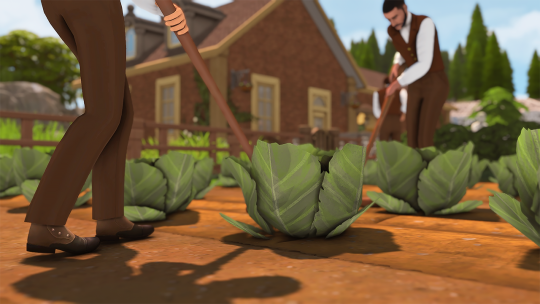
The Baudelaire family returned to Ireland the next day, only this time, they never had to worry about leaving.
Their new home had been abandoned years prior to them purchasing it and had been left vacant for quite some time after the previous family had fled those lands that had once been filled with such rich history. Overtime, the stories had been forgotten, perhaps almost purposely by those that occupied the neighborhood nowadays, existing only as children's fables or as myth.
One thing they did know though was that the land used to be a vegetable farm, quite a successful one too, and Lawrence intended to make it profitable once more. Already, the farm boys were put to work planting rows of cabbage, carrots and most notably, potatoes.
Hours of labor had gone into restoring the house to what it had once been before the family arrived and at last, it was returned to its original state of elegance. The perfectly laid brick was covered by thick ivy, and the grounds were surrounded by beautifully vibrant flowers, lush green plants, and tall, brilliant marble statues.
It all seemed like something out of a storybook rather than real life.
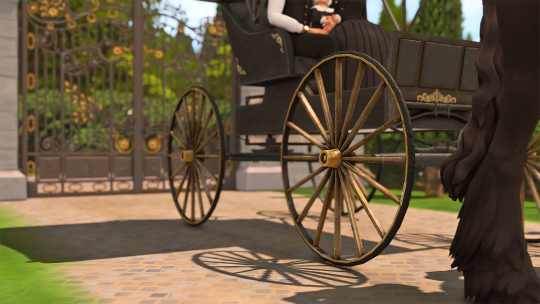

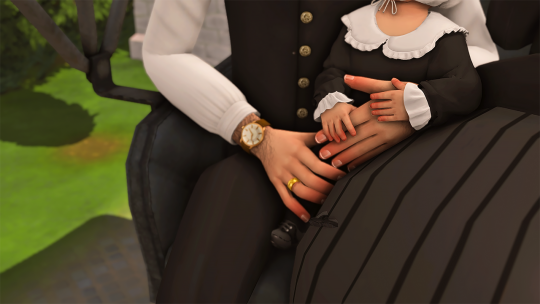
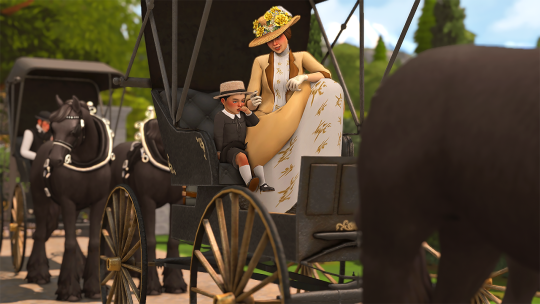
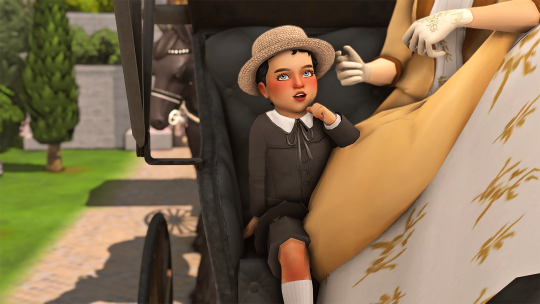
The travel horses pushed forward through the gates, and all any of them could do was gawk, unable to believe they were truly going to live here. Even the children, fussy and tired from such long travels, sensed the exhilaration from the adults and had begun to perk up with curiosity.
Ozzy, who rode with Beth in her carriage, stared up at the house in wonder, as though his little mind was trying to comprehend such a big change. "This is our new home, my little dove. We're going to live here now!" Beth whispered to the seemingly awestruck toddler next to her.
"Wooooow!" He exclaimed almost breathlessly, and though it was unclear if he actually understood what it all truly meant, Beth laughed in response, happily agreeing that 'wooow' was right.
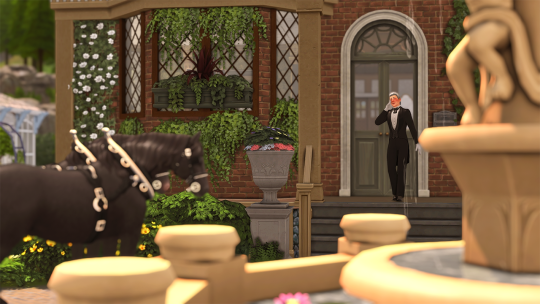



Most of their belongings arrived before The Baudelaires, already unpacked and put away thanks to a moving crew hired on by Lawrence. In addition, he had also taken it upon himself to hire various help, like maids, gardeners, cooks, and even a personal chef, and as Lawrence stepped out of the carriage and onto the stone pavement, he could see one of their footmen waiting patiently to greet them at the door.
"Well, hello there, Baudelaires!" He called out from the porch enthusiastically.
Lawrence waved a quick hello before holding out his arms to take Atticus. "That's Mr. O'Bannon. He worked for the family that lived here previously." He explained once Winifred had situated herself.
They joined Beth and Ozzy next, and walked hurriedly up the front steps while Mr. O'Bannon welcomed them home.

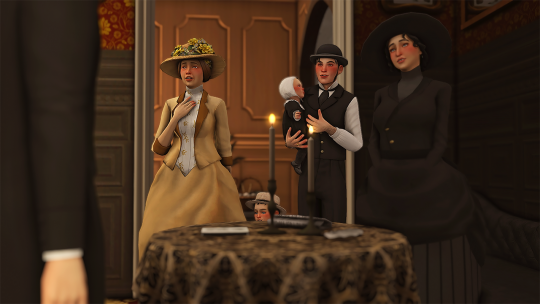
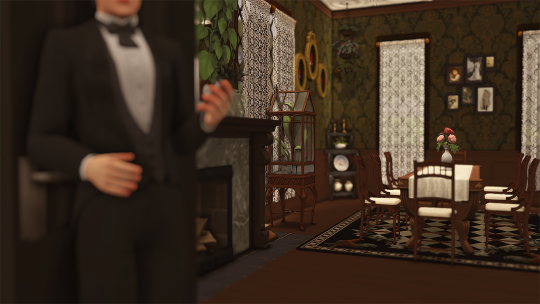


Winifred audibly gasped as she entered inside, her eyes growing wide in amazement at everything around her, and once everyone had stepped through the front door, they understood her reaction at once.
After they had filed in one by one, Mr. O'Bannon offered a tour of the house and they happily accepted. He informed them of the origins of their new furniture, boasting about the craftsmanship of the Irish workers and the prestigious color schemes of the wallpapering, most notably, the newly popular Scheels green in the parlor and the dining room.
The new decor was so complimentary of the things they had brought from home, they were almost unrecognizable sitting amongst such fine things, almost as if they were new items themselves.
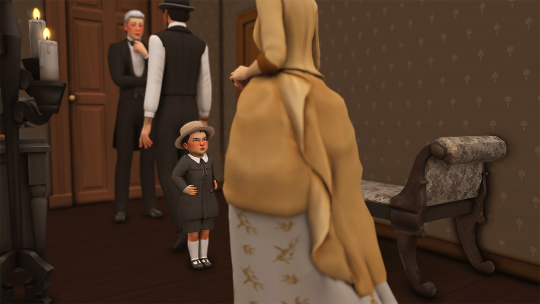
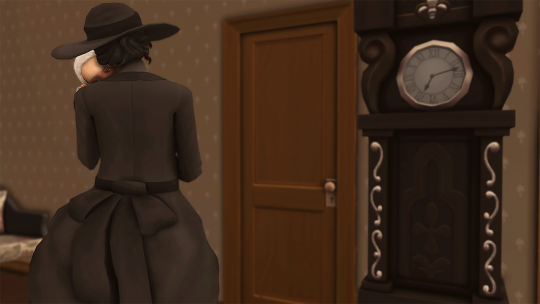
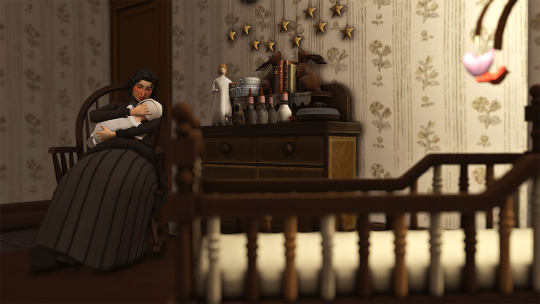
They had only made it through the first two floors before Atticus started falling asleep in his mother's arms, while Ozzy began to grow rather antsy. Winifred excused herself to rock with Atticus for a while and Beth, wanting to avoid a tantrum, decided to take Ozzy outside to get a better look at the water fountain out front. Which left Lawrence to finish off the tour with Mr. O'Bannon.
However, Mr. O'Bannon dismissed himself as well, needing to check how the luncheon was coming along and confirm the table was being set correctly. Lawrence didn't mind all that much, if anything, he was relieved to see how serious his staff seemed to take their jobs.
And so, just like that, everyone was off in different directions, making themselves right at home.
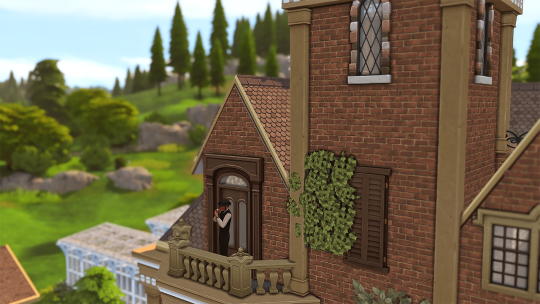
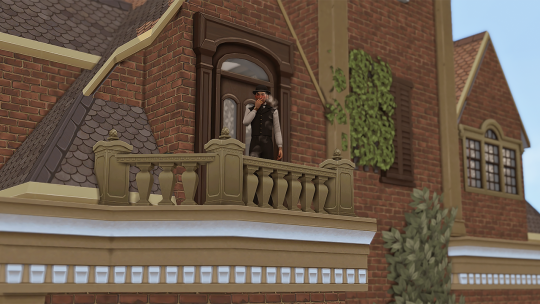


Lawrence, who now found himself alone, fancied himself a celebratory smoke out on the balcony. There, he smoked cigarette after cigarette while he watched over the farm hands below, reflecting how just months prior, he would have been down there in the dirt just like them. But, tilling soil and yanking weeds were a thing of the past, and someday soon, nothing but a distant memory.
Now, all there was left to do was assimilate to this new way of life.
next / previous / first
#foreshadowing galore here folks#posts will probably get a little shorter for a bit after this#but it's bc we are FINALLY in the crux of this decade#1893#ts4 historical#sims 4 historical#ts4 decades challenge#sims 4 decades challenge#ts4 storytelling#sims 4 storystelling#ts4 legacy#sims 4 legacy#the baudelaire legacy#1890#winifred baudelaire#lawrence baudelaire#oscar baudelaire#atticus baudelaire#beth herbert
77 notes
·
View notes
Text

Beth Levine / Herbert Levine: "Barefoot in the Grass” Sandals (1968)
6K notes
·
View notes
Text
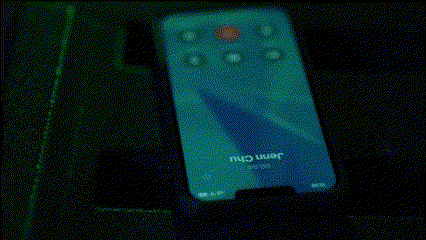



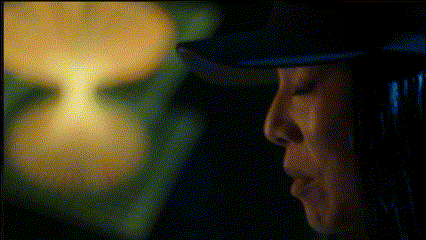

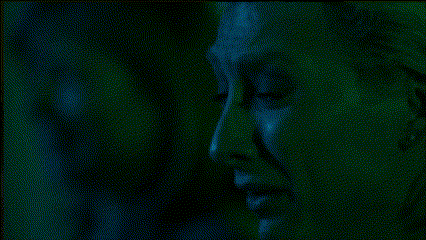
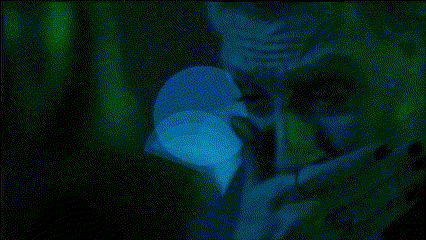

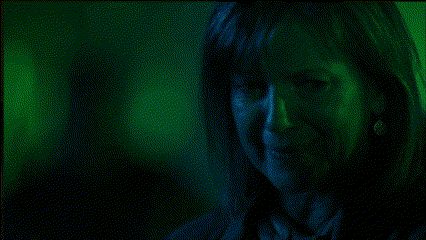
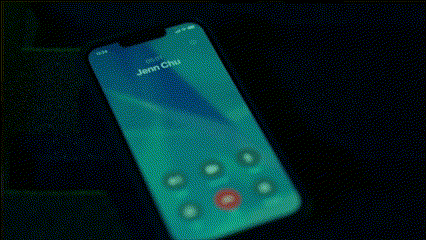
All this sacrifice, it's gonna be worth it.
𝐐𝐔𝐀𝐍𝐓𝐔𝐌 𝐋𝐄𝐀𝐏 𝐒𝟐𝐄𝟏𝟑 - 𝐀𝐆𝐀𝐈𝐍𝐒𝐓 𝐓𝐈𝐌𝐄
#ql.#quantum leap#quantum leap 2022#quantum leap 2023#quantum leap 2024#ian wright#addison augustine#ben song#magic#jenn chu#janis calavicci#beth calavicci#herbert williams#quantum leap spoilers#quantum leap gifs#mason alexander park#caitlin bassett#raymond lee#nanrisa lee
17 notes
·
View notes
Text



#sims 4#sims 4 hot mess#vasyl dodson#graham#herbert hollingsworth#mabel hollingsworth#mary beth hollingsworth#luanne hollingsworth#luke hollingsworth
20 notes
·
View notes
Text
'Just saw the Oppenheimer film and hungry for more?...
American Prometheus, by Kai Bird and Martin J. Sherwin. “The film is about Oppenheimer, not the project and afterwards. If you want to go deeper, I recommend you read the book the movie was based on and think more broadly about the impact of the Manhattan Project.”
“The Oppenheimer Issue” of Los Alamos National Laboratory’s National Security Science magazine has lots of great stories about Oppenheimer and the laboratory.
Plutonium 1943–1945, by Los Alamos Historical Society....
The Day After Trinity, “an Academy Award-winning documentary, which can be viewed for free on the Criterion app, is an excellent first-hand account with interviews of key scientists involved in the Manhattan Project, who knew Oppenheimer closely. This 1981 documentary is a very good complement to the movie, Oppenheimer. Some of the interesting figures interviewed extensively are Robert Oppenheimer’s brother, Frank; the Nobel laureate Hans Bethe; and Freeman Dyson, who were all part of the Manhattan Project. Their recollections of that important period and the underlying debates are invaluable oral histories for researchers and the general public.”...
Hiroshima “This short book, by John Hersey, is based on what was initially a lengthy article in the New Yorker and was published a couple of years after the atomic bombing. It gave Americans their first description of the actual effects of dropping the bomb. This helps make up for what many critics have felt was an omission in the movie.”
The Making of the Atomic Bomb, by Richard Rhodes, “is the definitive book account of the Manhattan Project and the science and engineering behind the bomb.”
The Winning Weapon, by Gregg Herken, “is a historian’s review of how the U.S. approached the questions of arms control and a possible arms race in the years right after World War II.”
The Advisors: Oppenheimer, Teller, and the Superbomb, by Herbert York, “is a good account of the dispute between Oppenheimer and Teller over whether to build the H-bomb, which became a key factor in the hearing that led to Oppenheimer losing his security clearance.”...
Fallout: The Hiroshima Cover-up and the Reporter Who Revealed It to the World, by Lesley M.M. Blume, “is a good companion book of John Hersey’s Hiroshima and was published on the 75th anniversary of the bombing.”
“If you want to add some perspectives from Hiroshima and Nagasaki, I would definitely recommend the Hiroshima Memorial Museum Online and the recently developed online No More Hiroshima and Nagasaki Museum.”
“The Bulletin of the Atomic Scientists Oppenheimer Collection has many good articles with various perspectives.”...'
#Oppenheimer#Kai Bird#Martin J. Sherwin#American Prometheus#Fallout: The Hiroshima Cover-up and the Reporter Who Revealed it to the World#Lesley M.M. Blume#The Advisors: Oppenheimer Teller and the Superbomb#Herbert York#The Winning Weapon#Gregg Herken#The Day After Trinity#Hiroshima#Richard Rhodes#Hans Bethe#Freeman Dyson#Frank Oppenheimer#Los Alamos
2 notes
·
View notes
Text

US Vogue February 1, 1957
1. Ghillie suede, with low heel, by Claire McCardell for Capezio. 2. Opera pump in black kidskin with pointed heel, by Margaret. 3. Flat white leather heel, patent leather toe and link, by Jean Bandler for Pappagallo. 4. Lace-up Oxford with Clark shaped stockings for Margaret Jerrold. 5. Very pointed calfskin shoe, new hook heel. By Beth Levine for Herbert Levine. 6. Buckleless satin sandal by Evelyn Lipare for Liparé.
1.Suède ghillie, avec bas-dessous talon, par Claire McCardell pour Capezio.
2. Escarpin opéra en cuir de chevreau noir à talon pointu, par Margaret.
3. Talon plat en cuir blanc, bout et lien en cuir verni, par Jean Bandler pour Pappagallo.
4. Oxford lacé avec bas en forme Clark pour Margaret Jerrold.
5. Chaussure en cuir de veau très pointue, nouveau talon crochet. Par Beth Levine pour Herbert Levine.
6. Sandale en satin sans boucle par Evelyn Lipare pour Liparé.
Photo Richard Rutledge
vogue archive
#us vogue#february 1957#fashion 50s#claire mccardell#capezio#pappagallo#margaret jerrold#jean bandler#herbert levine#beth#evelyn lipare#richard rutledge
5 notes
·
View notes
Text

"I have a wild desire to live after a thousand deaths that again and again transform me into that which you love, which awakens your love, which transforms you, which enters and dies in me and becomes the innermost chamber of my heart."
- Herbert Zand, tr. by Beth Bjorklund, from “I Have a Wild Desire to Die,” written c. April 1958
#literature#quote#reading#writing#book#novel#author#books#herbert zand#beth bjorklund#I have a wild desire to die#photography#desire#death#passion#love#heart
2 notes
·
View notes
Photo
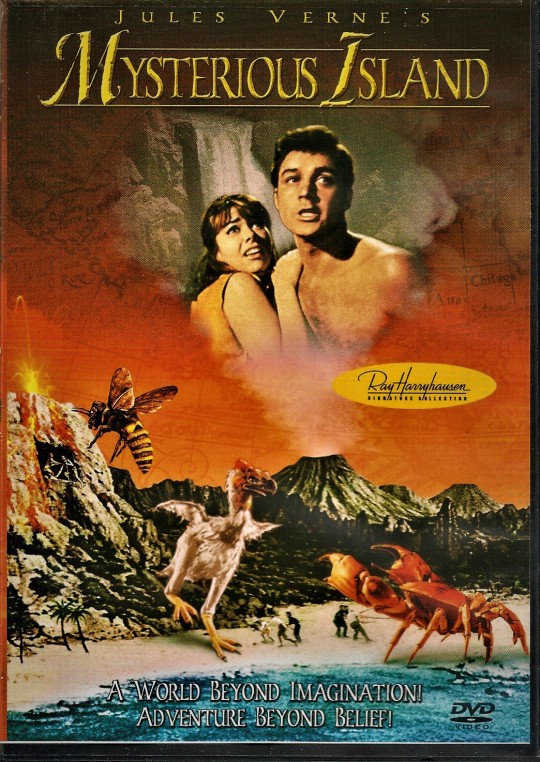
Bad movie I have Mysterious Island 1961
#Mysterious Island#Michael Craig#Joan Greenwood#Michael Callan#Gary Merrill#Herbert Lom#Beth Rogan#Percy Herbert#Dan Jackson#Harry Monty
1 note
·
View note
Text
Beth Orton Live Preview: 11/10, Mayfair Theatre, Chicago

Photo by Eliot Lee Hazel
BY JORDAN MAINZER
For Beth Orton, Weather Alive (Partisan) is somewhat of a rebirth. Her first album in 6 years, it was written on a described “cheap, crappy” piano set up in her garden shed that she had purchased at Camden Market. Following periods of grief and trauma surrounding the deaths of close collaborators Andrew Weatherall and Hal Willner and incorrectly diagnosed health problems, Orton was able to write songs about simple, yet abstract things that moved her: love, sex, music, and, yes, the weather. She found an all-star band to help realize her compositions, including drummer Tom Skinner, multi-instrumentalist Shahzad Ismaily, bassist Tom Herbert and saxophonist Alabaster dePlume. Best, Orton self-produced the record, name-checking and somehow nailing a who’s who of influences: Solange, Talk Talk, Springsteen’s Nebraska. The result is easily the best album of her career.
From the get-go, with its stunning title track, Weather Alive introduces its palate, clacking, gentle percussion and piano, muted, but emotive saxophone and bass, and Orton’s raspy, weary drawl. “Almost makes me wanna cry,” she sings, “The weather’s so beautiful outside.” Coming out of an age where realized how much we took for granted the ability to simply be outside, it’s easy to resonate with Orton’s words, awestruck at the natural world. On “Fractals”, explicitly inspired by Willner and Weatherall’s deaths, Orton sings over funky bass, skittering hi hats, and fluttering saxophone. The mathematical nature of the title contrasts how Orton describes creating with cohorts past and present: as “magic.” “Friday Night” is like a microcosm of the beginning of the summer, a symbol for vague hope before a period of time. For Orton, it’s a feeling of being able to potentially see loved ones again. “And though I’ll never get too close,” she sings, “I still hold you now and then.”
At the same time, Weather Alive is sometimes subsumed by dark moments that are no less gorgeous than the hopeful ones. “Lonely” begins with trombone from Aaron Roche, which has a suitably more foreboding quality than dePlume’s saxophone, and goes on to illustrate the depths of Orton’s shame. “Lonely likes my company,” she sings as Skinner’s drums crash. Later, her parents, who passed away when she was a teenager, appear on the song to scold her, telling her to “shut your mouth if someone desires you.” On “Haunted Satellite”, Orton’s voice is persistent, but ultimately shaky and broken. Album closer “Unwritten” unfurls over 7 minutes of sprinkling piano and light drums. “I was getting unwritten,” signs Orton before a droning instrumental outro. It’s an appropriate ending for an album steeped in mortality and sadness but appreciating the dreams along the way.
Tonight, as part of her first US headlining tour in 5 years, Orton performs at the Mayfair Theatre in the Irish American Heritage Center, somehow, someway adapting the “magic” of Weather Alive to the live stage. Expect to hear the full album as well as favorites from favorite records like Trailer Park and Central Reservation. Musician and composer Heather Woods Broderick, who’s playing in Orton’s band, will give an opening set of her material.
youtube
#live picks#beth orton#irish american heritage center#partisan#tom skinner#heather woods broderick#weather alive#mayfair theatre#eliot lee hazel#partisan records#andrew weatherall#hal willner#shahzad ismaily#tom herbert#alabaster deplume#solange#talk talk#bruce springsteen#nebraska#aaron roche#trailer park#central reservation#springsteen
0 notes
Text


anonymous heart sandals c. 1960s and beth + herbert levine 'barefoot in the grass' sandals c. 1968 in fashion: a history from the 18th to the 20th century - kyoto costume institute (2015)
93 notes
·
View notes
Text

Evening shoes, Designer Beth Levine, American, Manufacturer Herbert Levine Inc. American, 1958
24 notes
·
View notes
Text
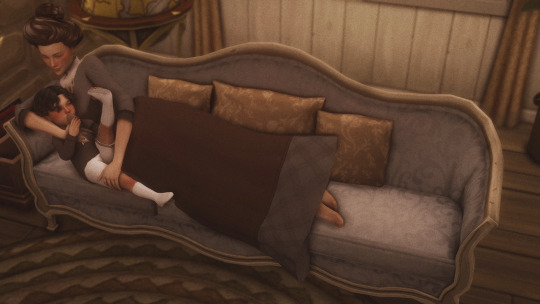
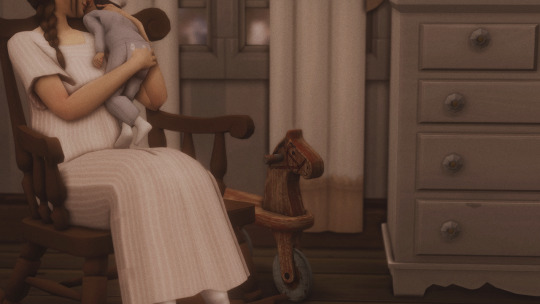
Back at home things were not all that they seemed. It was true that Ozzy was a healthy young boy but there were things that she had omitted in her letters that had begun to worry her.
Like the fact that Ozzy still preferred to be rocked to sleep and held through the night or that her attempt at weaning him off a baby's bottle had proven to be futile.
However, the most troubling of all was none of these things.
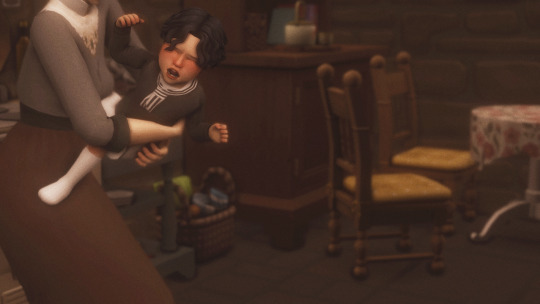

Ozzy had become attached to her hip at all times over the last few months. So much so that when it came time for her to cook, clean, knit, or really anything that tore her eyes away from him, he would erupt into explosive tantrums.
Beth tried what she could by way of soothing or reasonable punishment but nothing seemed to help.
When she shared her worries with the others, everyone told her that it was only just a phase and he would eventually grow out of it. Most of all, they insisted it was no reason to end The Baudelaire's holiday.
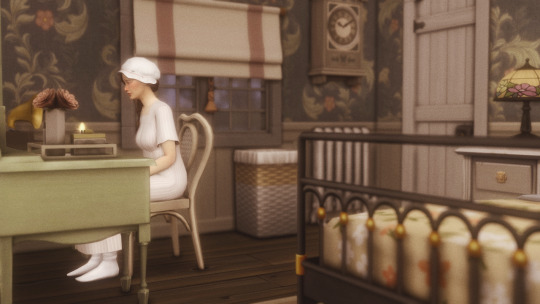


Despite everyone’s reassurance though, she couldn't shake the dreadful feeling in her bones telling her something was wrong with the child.
In the few precious moments she had to herself, she would even began to blame herself, fretting that she had done something terribly wrong.
All she could do was hope that everyone was right and the child would turn out just fine.
next / previous / first
#ts4 historical#sims 4 historical#ts4 decades challenge#sims 4 decades challenge#ts4 storytelling#sims 4 storystelling#ts4 legacy#sims 4 legacy#the baudelaire legacy#1890#oscar baudelaire#beth herbert
66 notes
·
View notes
Text
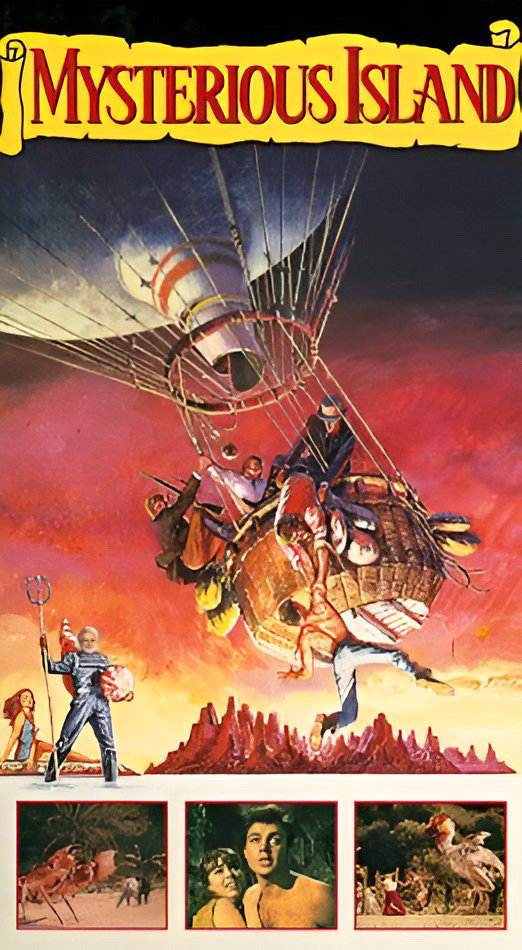
I’ve just rewatched “The Mysterious Island” (1961), based on a novel by French author Jules Verne. It’s set in the 1860s and tells the story of several Union soldiers who escape a Confederate prison via a hot air balloon. A fierce storm transports them to a remote and “mysterious” island in the South Pacific. There they help rescue two women, passengers of a boat that sunk in the same storm.
Things get interesting when they encounter several giant animals on the island - crabs, chickens, and even bees. All of them were achieved via the amazing effects created by Ray Harryhausen and his team. They holdup surprising well for a movie released over 60 years ago. Today, in a similar movie, the effects would be done via CGI. But Harryhausen’s stop motion effect feel so much more fresh and visceral.
The music for the film was done by Bernard Herrmann, Harryhausen’s frequent collaborator. The music is appropriately adventurous and dramatic.
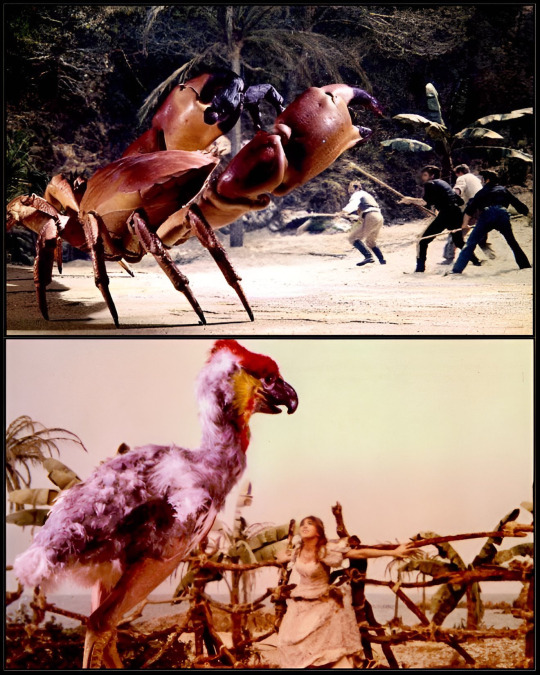
The only effect that doesn’t stand the rest of time is the volcanic eruption at the climax of the film. It’s clearly a model and the lava doesn’t have the “weight” of liquid rocks.
Outdoor scenes were filmed on the Catalan coast in Spain, with indoor filming occurring in England. The overall design is pretty good, especially Captain Nemo’s ship the Nautilus.
The cast is mostly English, with three exceptions. Nemo was played by Czech actor Herbert Lom (best know for playing Inspector Dreyfus in the Pink Panther films); Gary Merrill (who divorced Bette Davis only a year earlier); and Michael Callen, a young actor popular on Broadway and films in the 1960s.
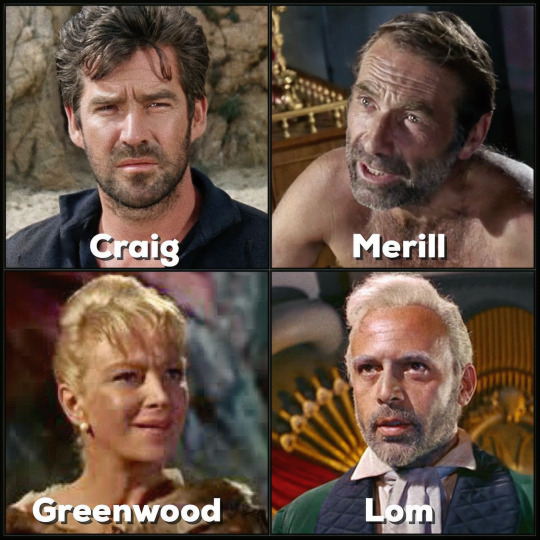
Callen is a prime example of how the perception of men has changed over the years. Callen plays the heart throb and is shirtless in most of the movie. But by today’s standard he looks incredible skinny with no muscle tone.
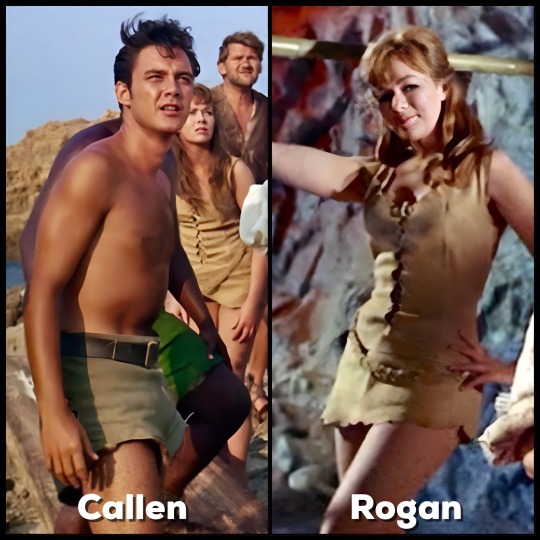
I particularly like Michael Craig who played the castaways leader. I thought I’d seen him in some old TV westerns but nearly all of his credits are British.
The two women are played by Joan Greenwood as Lady Fairchild and Beth Rogan as her niece Elena. Greenwood has a very artificial sounding voice and I thought her dialogue may have been dubbed over by another actress (it wasn’t). About half way into the movie, Rogan switches from a long dress with petticoats into a very small and revealing leather tunic. It’s so short that her underpants are frequently revealed as she runs across the beach.
I saw “The Mysterious Island” via TUBI, a free streaming service. There were occasional commercial but not as intrusive as broadcast TV.
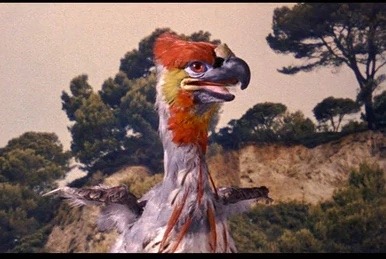
#Jules Verne#mysterious island#Captain nemo#Herbert lom#micharl callen#gary merrill#giant chicken#ray Harryhausen#stop motion effects#Bernard Herrmann
21 notes
·
View notes
Text
2023 Books
Originally I wasn't going to share the books I read this year on here, but then I changed my mind lol. It's convenient for me.
Read
The Red Scholar's Wake by Aliette de Bodard
The Sparrow by Mary Doria Russel
Anna Karenina by Leo Tolstoy
Giovanni's Room by James Baldwin
Family of Origin by CJ Hauser
Mermaid Scales and the Town of Sand by Komori Yoko
Luster by Raven Leilani
Such a Fun Age by Kiley Reid
You Could Make This Place Beautiful by Maggie Smith
Sunshine by Robin McKinley
Fluids by May Leitz
The Vegetarian by Han Kang
Convenience Store Woman by Murata Sayaka
The Half Moon by Mary Beth Keane
Legends and Lattes by Travis Baldree
Memorial by Bryan Washington
This Is How You Lose the Time War by Amal El-Mohtar and Max Gladstone
The Joy Luck Club by Amy Tan
Howl's Moving Castle by Diana Wynne Jones
Strike the Zither by Joan He
Deep as the Sky, Red as the Sea by Rita Chang-Eppig
The Salt Grows Heavy by Cassandra Khaw
Our Wives Under the Sea by Julia Armfield
The Virgin Suicides by Jeffrey Eugenides
The Death of King Arthur: The Immortal Legend by Peter Ackroyd
The Bookshop and the Barbarian by Morgan Stang
The Third Hotel by Laura Van Den Berg
Dune by Frank Herbert
Wicked Saints by Emily A. Duncan
Hell's Paradise by Kaku Yuji
Dungeon Meshi by Kui Ryoko
Ruthless Gods by Emily A. Duncan
Teaching My Mother How to Give Birth by Warsan Shire
Healing Your Inner Child: Re-parenting Yourself For a More Secure and Loving Life by Natasha Levinger
Witchcraft Therapy by Mandi Em
Bless the Daughter Raised by a Voice In Her Head by Warsan Shire
Celtic Mysticism by Tracie Long
A Certain Hunger by Chelsea G. Summers
Bookshops and Bonedust by Travis Baldree
Men in the Off Hours by Anne Carson
Ongoing
One Piece
Toilet-bound Hanako-kun by AidaIro
Dai Dark by Hayashida Q
Gokurakugai by Sano Uto
Witch Hat Atelier by Shirahama Kamome
10 notes
·
View notes
Text
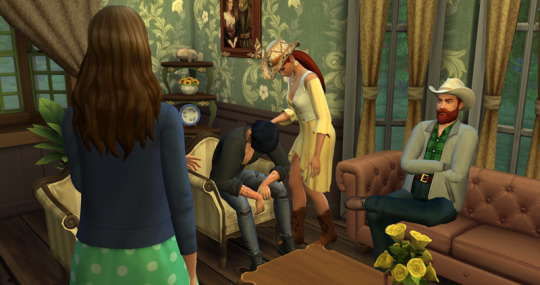
MB: I'm completely mortified, Vasyl.
H: Eh, boys will be boys. They'll work it out.

MB: They are not boys. They are men and men do not throw punches because they cannot have a conversation.

H: This is men's business, Mary-Beth. In my day, one or two fights later and someone you hated became your best friend. Just give it time.
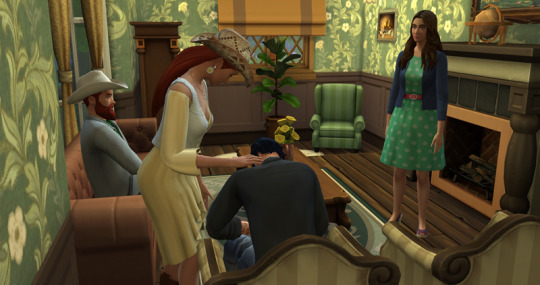
MB: We did not raise our son to be so juvenile.
L: Why don't we get you cleaned up, Vas?
#sims 4#sims 4 hot mess#herbert hollingsworth#mary beth hollingsworth#luanne hollingsworth#vasyl dodson
20 notes
·
View notes
Text
2023 Reading
I read a lot apparently! Below are my thoughts on the stories I've read so far this year. Also, if you’ve read a book and absolutely loved it, pitch it in the comments! Tell me why I should read it!
January
Do Androids Dream of Electric Sheep by Phillip K. Dick (4/5 stars)
This was a short read and overall I thought it was good. I thought the way the "andys" were characterized was particularly interesting. I think the book, despite being so short, was a filled with ideas and world building and what struck me is that those things didn't make the world feel more real. It felt as though those pieces of world-building served more to characterize our protagonists by way of their reaction to those ideas/religion/machines rather than serving to flesh out the world itself? Which is not necessarily bad, but idk, I guess I just wish the world felt more real or made a bit more sense to me.
The Mist in the Mirror by Susan Hill (3/5 stars)
I don't have a lot to say about this one. It was fine. Susan Hill is pretty good at atmosphere. I found the ending unsatisfying.
Little Women by Louisa May Alcott (3.5/5 stars)
This one was also fine. And I know it's nit-picky but I cannot get over the mother letting Beth's pet bird die in order to make a point about the importance of doing chores? Beth is a child and the bird didn't need to starve to death. Fuck you, Marmee.
Midnight Sun by Stephanie Meyer (5/5 stars)
Look, you have to already like Twilight to like this book. If you don't like Twilight or have never read it, then this book will not be enjoyable. If, however, you have read and enjoyed the Twilight series, then this book is great! You get insight into the world of Twilight, of Edward's character, of his family's thoughts and how they interact, and a look at his dark years of human hunting.
February
Twilight by Stephanie Meyer (5/5 stars)
I love this book. I love the drama, the devotion, the camp, the characters. I cannot judge this book objectively, therefore 5 stars. I reread it in honor of my upcoming vacation to the Forever Twilight in Forks festival and I'm so glad I did!
The Bloody Chamber and Other Stories by Angela Carter (4/5 stars)
This is a collection of short stories. Each is a re-imagining of a fairy tale/legend. There was a lot of dark, feminine energy to these stories which I enjoyed. I would caution anyone who want to read the stories to first look up trigger warnings on storygraph, as the tales do get quite dark and gruesome at times.
The Blazing World by Margret Cavendish (3/5 stars)
This is a work of utopian science fiction written in 1666. It's short and not terribly interesting as a story but incredibly interesting as an early work of science fiction by a woman. Would recommend if you're interested in the history of genre fiction.
Beloved by Toni Morrison (3.5/5 stars)
This one was tough. The characters were brutal, their situations were brutal, and it was hard to read about. I did, however, like the narrative style and think it is an important work of fiction. I don't think it should be classified as a ghost story, as it often is.
The Bell Jar by Silvia Plath (4/5 stars)
This was a good book and a realistic depiction of what mental illness can look like. It was very much a downer though, especially with what we know about the author's life.
"A Good Man is Hard to Find" by Flannery O'Connor (undecided)
This is a short story. It does a good job of telling a story and allowing you to know the characters despite how short it is. I'm not sure how to rate is as I'm sure if I really "get" it.
Heretics of Dune by Frank Herbert (1/5 stars)
My gosh! I hated reading this. I didn't care for God Emperor of Dune either but I felt I'd read so much of the series that I might as well finish it out, after all there was only two more books to go. Well. I won't be finishing it out. I finished this book but I will not be reading Chapterhouse: Dune. I'm so over the weird pedophilia that just gets more prominent with each Dune book. And one of the greatest things about Dune is the worldbuilding, but so much time has passed between the first book and this one that we are no longer in the same world. I cared about that world from the first couple books, but this one? I don't care anymore. I don't care about the characters either.
Oranges Are Not the Only Fruit by Jeanette Winterson (3.5/5 stars)
This was a good coming of age story, although, to my relief, not very relatable. I found the story compelling but didn't care for the time jumps. I learned that it is partly autobiographical, which makes certain parts of the story make more sense.
The Vegetarian by Han Kang (3.5/5 stars)
This was alright. I get the appeal. It was distressing to read at times.
Vicky Angel by Jacqueline Wilson (2/5 stars)
Look, I just didn't like the book. I understand it's an exploration of childhood grief written for children and so I am certainly not the intended audience, but still, this was just not good. And the ending? Ugh.
March
Mrs. Dalloway by Virginia Woolf (3/5 stars)
This is a stream of consciousness story with a few time jumps back and forth. I liked reading some parts, others not so much. It can get a bit dull at times. Iconic last lines.
The Complete Tales of Peter Rabbit and Friends by Beatrix Potter (3/5 stars)
As with many collections, there are some stories I enjoyed and some I did not. A couple that I thought I would not want read to any children in my life, which surprised me because these are such beloved stories.
The Word for World is Forest by Ursula K. Le Guin (4/5 stars)
Enjoyable but not my favorite. Not something I would revisit I think. Lots of themes here about colonization, military, environmentalism, etc. A bit heavy handed, but that doesn't really bother me when I agree with the message being set forth.
April
nothing. no books here. I read part of Kindred during this month but didn't finish it until early May.
May
Kindred by Octavia E. Butler (4/5 stars)
I've always meant to read Octavia Butler's books but I'm not sure this was the best one to start with. Nevertheless, it was good.
A Closed and Common Orbit by Becky Chambers (4/5 stars)
I liked this one much better than the first book in the series, The Long Way to a Small, Angry Planet. It did drag on a bit at times. I also feel like a lot of the tension could have been resolved quickly by characters just talking to each other which drove me nuts.
20,000 Leagues Under the Sea by Jules Verne (3/5 stars)
It's not that this isn't a good book or an interesting work of early science fiction, it just dragged. I was so bored at times. This book took me so long to finish.
A Murder Is Announced by Agatha Christie (4.5/5 stars)
I can't quite bring myself to give this 5 stars. It was good though. As is always the case with Agatha Christie books, I did not guess the conclusion but feel as though I could have. Like there were probably enough hints, I just didn't pick up on them.
June
We Have Always Lived in the Castle by Shirley Jackson (5/5 stars)
This was a very good read. Great atmosphere. I liked the way things were revealed. If you like a gothic tale or any of Shirley Jackson's other works, then certainly give this one a go.
I watched the movie in October and it was pretty faithful, as far as adaptations go. I did prefer the book.
August
New Moon by Stephanie Meyer (4/5 stars)
Look, is it as good as Twilight? No, but I still like it. I care about the characters and this book offered fun new additions to the world that Twilight introduced.
Eclipse by Stephanie Meyer (4/5 stars)
Second verse, same as the first.
The Knight, the Fool, and the Dead: Time Lord Victorious by Steve Cole (3/5 stars)
This was much shorter than I expected and ended in the middle of the story, which I didn't realize going in. It was fine. It's my first Doctor Who book and I didn't love it, which I am disappointed about.
The Short Second Life of Bree Tanner by Stephanie Meyer (3.5/5 stars)
I do like this book, but it's not my favorite. I particularly liked the character of Freaky Fred and I'm glad I reread this book so that I could be reminded of him.
A Midsummer Night's Dream by William Shakespeare (4/5 stars)
I watched a play adaptation as I read along, which I find really useful for me when reading Shakespeare. I have trouble imagining how the characters say a line, what they would be doing as they say it, etc. so watching helps me contextualize. I liked it. I thought it was funny. It wasn't perfect and I didn't love the wrap up but, overall, it was enjoyable.
The Merchant of Venice by Shakespeare (2/5 stars)
I listened to the audio book rather than reading the play. I did not care for it. I thought the ending was fascinating but other than that, this was just not my cup of tea.
All Flesh is Grass: Time Lord Victorious by Una McCormack (3/5 stars)
This one was slightly better than the previous Doctor Who book, but I still didn't really care for it. It's hard to put my finger exactly on why though.
Breaking Dawn by Stephanie Meyer (3.5/5 stars)
It pains me to give such a low rating to a book in a series I love so much, but this book is just not as good as the others. I still like it okay, but not like I love the others. Maybe she can redeem it in the next book. (That's right. I'm still holding out hope that we'll get another and it'll fix the bits I don't like about this one.)
September
The Body in the Library by Agatha Christie (4/5 stars)
I thought this one was quite good. I am bummed, as always, that I couldn't guess the killer.
Gigi and The Cat by Colette (3/5 stars)
This is actually two separate stories. I preferred Gigi I think, but both were solidly 3 stars. The most interesting thing was the little biography about Colette at the beginning of the book.
Much Ado About Nothing by William Shakespeare (4/5 stars)
This one was enjoyable. Again, I did a read-along as I watched the play performed. It had some fantastic lines.
Sharp Objects by Gillian Flynn (3/5 stars)
Look up trigger warnings about this one before you read. The book was just okay. I guessed the ending pretty early on, which I've been led to understand is not usual for this book. I think is probably the mark of a good thriller writer if most people won't guess the ending/twist/killer/etc but you've included enough clues so that a small subset of the audience will. But it didn't make for a particularly interesting read if you're in the subset that picked up on the clues early. I also was very interested to see how the writer handled the issue of self-harm in the book. Still not sure how I feel about it.
October
Hallowe'en Party by Agatha Christie (3/5 stars)
I didn't enjoy this one quite as much as I enjoyed the last Chrisie book I read, but it was okay I think. I read it because I wanted to watch the movie coming out, and I think murder mysteries are so much more interesting in book form.
Watched the movie and decided there’s no way this should be considered an adaptation of the book. A couple of names remain the same but the characters, their relationships, and the murders are so wildly different than they are in the book that I don’t even see the point of using the same names.
Gideon the Ninth by Tamsyn Muir (4/5 stars)
I liked it overall. I liked the characters. I think a little more development of our main two would have been nice. Controversial, but I did NOT like the meme references. Why would Harrow know the “studied the blade” joke? Also, why does Harrow know what a Cuckoo is? And apparently they’re all speaking English 10,000 years in the future because otherwise Gideon’s Sex Pal joke wouldn’t work. The ending made me sad.
Harrow the Ninth by Tamsyn Muir (3/5 stars)
I liked the story overall and I think the AUs were fun, but I think they took up way too much of the book. I especially liked getting to see Gideon again and to hear her thoughts about what’s going on.
Nona the Ninth by Tamsyn Muir (3/5 stars)
Maybe this one’s on me, but I can’t figure out where the conversation with Jod is happening? It takes up half the book and I don’t understand it at all. It just feels like exposition dump. I’m really hoping I like the next one better.
Fingersmith by Sarah Waters (3/5 stars)
This isn’t a bad book, but it’s not really to my tastes. It’s a period drama and sapphic.
The Goblin Emperor by Katherine Addison (5/5 stars)
I’ve read this one before and it’s a favorite of mine. It’s slow moving and, when I first read it, was such a relieving break from all the grimdark fantasies that were everywhereeeee at the time. (This book came out when Game of Thrones was at its height in popularity.) this book is just nice and so is Maia.
All Systems Red by Martha Wells (5/5 stars)
I enjoyed this book. So much so, that I read the rest of the series and then immediately went back to reread it again. I like murderbot. I also want to face the wall in a corner when people try to ask me about my feelings.
Artificial Condition by Martha Wells (4/5 stars)
This one might be my least favorite of the murderbot diaries, but I still like it. (That being said, I think I’ll grow to like it more in time. After all, we get the foundation of MB and ARTs relationship.) It introduces ART, gives us more context for MB’s past, and allows for MB’s sense of self to develop. By the end, we (and it) have a much better understanding of how it feels about humans and what lengths it’s willing to go to. The book also gives much needed explanation about how MB manages to blend in and operate. So all in all, I like it but feel like it’s mostly just filling in gaps.
Rogue Protocol by Martha Wells (4/5 stars)
Another good one! Really challenging how MB views human/bot relationships. MB is such a funny narrator, it spends so much time being like “I don’t care” and then proceeds to care So Much. Also Miki <3
Exit Strategy by Martha Wells (5/5 stars)
Wooo!! The gang is back (partly). MB must face those it’s run away from! Weapons and hacking and emotional stand offs! What more could you want?
Network Effect by Martha Wells (5/5 stars)
This one might be my favorite. I really liked it. I love when a character goes feral because their friend is dead/in danger and this book does it TWICE. It’s so good!
Fugitive Telemetry by Martha Wells (4/5 stars)
This one is another gap filling book. It lets us see what MB got up to while on Preservation. Which, if you’re really interested in the character (which I am) then it’s a good read! Also we got to see Gurathin and Ratthi again and I love them both.
2 notes
·
View notes